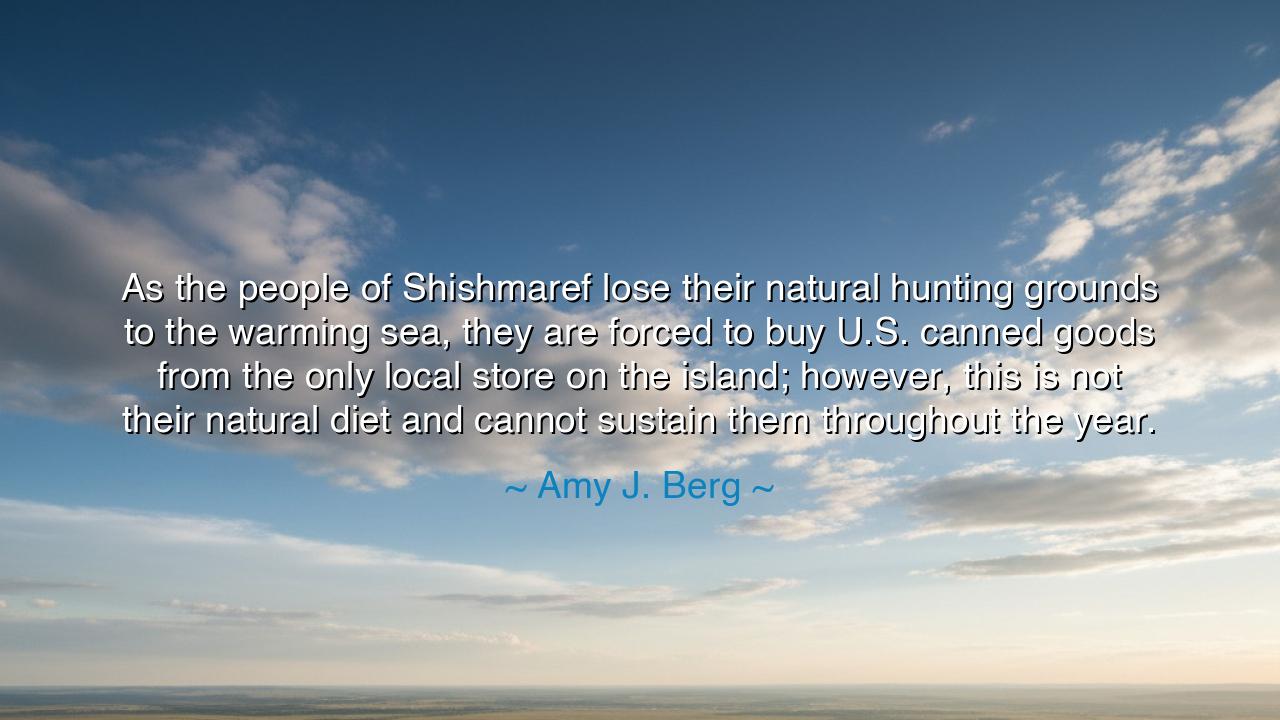
As the people of Shishmaref lose their natural hunting grounds to
As the people of Shishmaref lose their natural hunting grounds to the warming sea, they are forced to buy U.S. canned goods from the only local store on the island; however, this is not their natural diet and cannot sustain them throughout the year.






The words of Amy J. Berg, “As the people of Shishmaref lose their natural hunting grounds to the warming sea, they are forced to buy U.S. canned goods from the only local store on the island; however, this is not their natural diet and cannot sustain them throughout the year,” are not merely a lament for one village — they are a cry for the whole of humankind. In these words lies the sorrow of an age where nature’s balance has been broken, where those who once lived in harmony with the land now find themselves prisoners of the marketplace. The tale of Shishmaref, an island village in Alaska, stands as a mirror of our collective neglect — for when the sea warms and the ice melts, it is not only the earth that suffers, but the human spirit that is exiled from its roots.
In ancient times, the relationship between humans and nature was sacred. The hunter knew the song of the animal he pursued, the farmer blessed the soil before planting, and the fisherman thanked the waters for their bounty. The people of Shishmaref, too, inherited such wisdom — their diet, drawn from seal, fish, caribou, and berries, was not merely sustenance but ceremony, a living expression of respect for the cycles of life. To be cut off from this natural abundance, to trade it for canned goods and processed foods, is not just a change in diet; it is a breaking of the covenant between humans and the earth. What Berg describes is not merely the loss of food, but the loss of belonging.
This tragedy is the fruit of climate change, that slow and merciless unweaving of the world’s order. As the sea warms, the ice that once shielded the people of Shishmaref vanishes, the shores erode, and the animals migrate away. The hunter becomes helpless, not from laziness or weakness, but because the patterns of nature that guided his ancestors have been rewritten by greed. The store-bought can replaces the fresh catch, the metallic taste of industry replaces the richness of life. And so, the body weakens, the spirit dulls, and the community’s rhythm — once aligned with the tides — falls out of tune.
There is an old story from the Arctic, told among the Inuit, of a woman named Sedna, the Mother of the Sea. When humans grew wasteful and forgot their reverence for the animals, Sedna withdrew her gifts, locking the fish and seals beneath the waves. The hunters suffered until they remembered humility and offered her repentance. Today, the tale repeats itself — but this time it is not myth, but reality. The warming sea is Sedna’s silence; the disappearing food, her withheld grace. And until humanity remembers the old ways of respect — for the earth, the air, and the waters — the bounty will remain hidden, and even the wealthiest nations will find their tables empty of true nourishment.
The “U.S. canned goods” in Berg’s words are symbols of dependency — bright metal disguises for decay. They represent the false promise of modernity: that we can replace nature’s abundance with the cold convenience of commerce. But no tin can hold the essence of life; no machine can mimic the pulse of a living world. The people of Shishmaref are not simply victims of distance or weather — they are the first witnesses of a civilization that has traded wholeness for consumption, connection for control. Their plight is a prophecy: what happens on their island today may happen across the earth tomorrow.
From this story we must learn, as our ancestors once knew, that food is not separate from the earth that gives it. To heal our diets, we must heal our environment. To nourish our bodies, we must nourish the land and sea. The solution does not lie in more stores, more packaging, or more promises of industry, but in restoring the balance — in remembering that we are what the earth allows us to be. The health of a people cannot be divorced from the health of their soil, their waters, or their air.
Let this, then, be the teaching: honor the sources of your sustenance. Eat what comes from your land, respect the seasons, and give back to the earth what you take. Do not let technology or profit blind you to the sacred exchange that keeps all life alive. And above all, listen to the cry of places like Shishmaref — for their suffering is not isolated, but the echo of a world out of harmony.
For as Amy J. Berg reminds us, when a people are forced to eat what does not belong to their nature, they do not simply lose their health — they lose their identity. And when the earth itself can no longer sustain her children, the fault lies not in the sea, nor in the sky, but in the forgetfulness of man. Let us remember, then, before the last ice melts and the last song of the hunter fades, that the true diet of humanity is not found in the can or the market — but in the living embrace of the planet that once fed us, and will feed us again, if only we learn to live with reverence once more.






AAdministratorAdministrator
Welcome, honored guests. Please leave a comment, we will respond soon